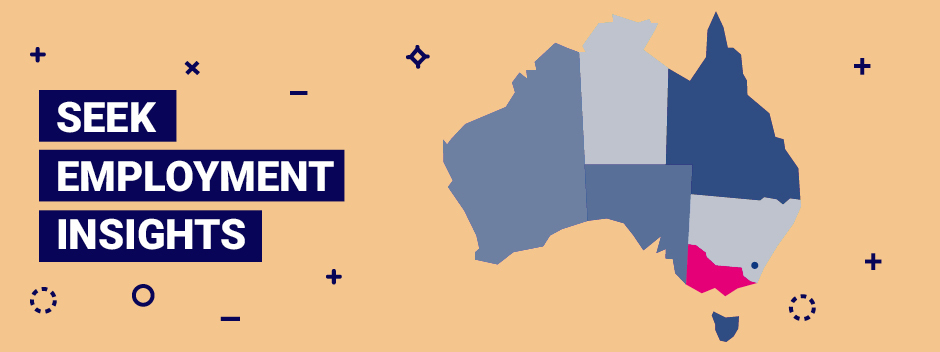When Victoria experienced a setback in its COVID-19 recovery in July, the impact was felt by candidates across the state. But how are things playing out across the rest of Australia, and what are people thinking and feeling about their working lives now?
Here’s a look at the latest insights, plus how one organisation is focusing on candidate care.
Research conducted on behalf of SEEK reveals how COVID-19 has impacted the working lives of Australians. It shows that optimism about future employment prospects among Victorians slipped from 62% in June to 57% in July. This is 3% below the national average.
Candidates across the country were feeling the strain. Despite signs of recovery in May, when feelings of job security returned to pre-COVID levels of 66% nationally, the figure slipped to 60% in July. The figure was down to 55% in Victoria, while Queenslanders recorded a 13% decline compared to June.
Employees and candidates are also feeling less in control of their working lives. While the national sentiment returned to pre-COVID levels of 65% in May, it plunged to a new low of 51% in July. Victorians were most affected, with a drop of 18% since June. Meanwhile, the sense of control over working lives among people in New South Wales and Queensland declined by 13% and 7% respectively.
Ivan Colhoun, Chief Economist at NAB, says the economic impact of Victoria’s second wave of COVID-19 should not be underestimated.
“Victoria’s direct impact accounts for about a quarter of the national economy,” he says. “Also, when Victorians are locked down, they can’t travel, and that affects the rest of the country.”
While more than one in four candidates were actively searching for jobs in July, those who felt confident in finding a role fell to a 2020 low of 43%.
Of the industries, Professional Services is taking the longest to recover across Australia. In July, 50% of workers in the sector felt that there were not enough jobs on the market.
Mark Smith, Managing Director at people2people, which specialises in professional services, says fewer workers in the field are willing to change jobs in the current market as they are prioritising job security.
“People are very concerned about what they may be trading off if they move jobs,” he says. “There is an attitude of ‘better the devil you know’ at the moment.”
Smith adds that despite a rise in unemployment, employers should not assume that they hold more power during the recruitment process.
“I suggest that employers understand the circumstances of candidates before making an offer. If they are currently in a job, they need to be convinced to move elsewhere due to a general sense of uncertainty and insecurity.
“Of course, it’s difficult to guarantee job security at a time like this,” adds Smith. “But employers and recruiters need to engage with candidates during the recruitment process because there is a sense of hesitancy among talent at the moment.”
At UniSuper candidate care is a priority, especially during this time of uncertainty.
Mark Devine, Talent Acquisition Lead at UniSuper, says while recruitment has been consistent over the past six months, the volume of roles is a “not quite at the level as this time last year”.
“We’ve noticed a significant increase in applications since the start of the crisis,” he says. “In a few instances, roles that may have previously attracted 10 or 20 applications are now spiking to around 150.”
Devine says that UniSuper has put a strong focus on supporting employee wellbeing during the crisis.
“In the talent acquisition team, we’ve been looking at what we can do to support candidates at this time,” he says. “This includes engaging with them about how the recruitment process will work in a remote setting and keeping them informed of progress. It’s also about partnering closely with hiring managers so they are well prepared to hire in a different way and recognise some of the challenges their candidates may be facing for the first time, whether it’s virtual interviewing or being unemployed for the first time in their careers.
“The feedback from new recruits is that they felt really supported during the process and now that they’re up and running.
“Our approach to attracting talent has remained the same – we focus on promoting our values and purpose, then selecting talent that opts in to those values, while also having the capabilities we need to take us forward. It is still about finding the right person, for the right role, at the right time,” says Devine. “That doesn’t change in a crisis like COVID.”
If your business is in a position to hire now, there are simple adjustments that can help you adapt your hiring process for COVID-19 and beyond – including adjusting your job ad, effective remote interviewing and onboarding differently. If you’re onboarding new employees remotely, these tips could help.
For now, the ongoing impact of the pandemic means many employers are dealing with difficult changes and situations – if that’s the case for you, these key COVID-19 resources for employers and businesses could help you find the right information and support.
Source: Independent research conducted by Nature on behalf of SEEK. Interviewing 4800 Australians annually.
Published August 2020

.jpg)


.jpg)
